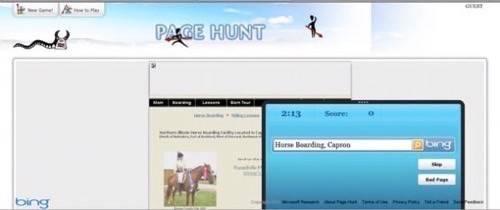Microsoft just launched Page Hunt, a game that presents web pages to players and asks that they guess key words to hunt them down. In the past, RWW has covered a number of search relevancy projects that incorporate human computational power including Semanti. But few projects have been presented to volunteers in such a fun and easy way.

Once a game begins, players are presented with a web page and receive points to guess keywords for the pages in the top 5 results. Unveiled by Microsoft’s Chris Quirk and Raman Chandrasekar at the Association for Computing Machinery’s Special Interest Group on Informational Retrieval (SIGIR) Conference, the game is aimed at improving search algorithms and ranking.
MIT’s Technology Review compares PageHunt to Luis von Ahn’s spam-fighting puzzles and image tagging games. Nevertheless, for initial volunteer buy-in, it may actually have closer ties to Wikipedia. While the projects seem very different, they actually share similar missions. Wikipedia is aimed at collecting and distributing educational content to global audiences. Meanwhile, Microsoft’s Page Hunt aims to increase the relevancy and speed at which information can be found.
Very few projects offer the general public a chance to volunteer in improving the sum of human knowledge in such a significant way. Wikipedia volunteers are often fiercely devoted to curating their pages knowing that even the US Health Department is factoring the community into their outreach strategy. Page Hunt’s search relevancy game players may adopt a similar mentality.

One key barrier to this sort of adoption is the fact that Page Hunt’s info will not likely be shared with non-Microsoft search players. Meanwhile Wikipedia content is shared freely as public domain information. It will be interesting to see if the Page Hunt community fleshes out in the same manner or if a less-proprietary search game will spring up in its place.





















